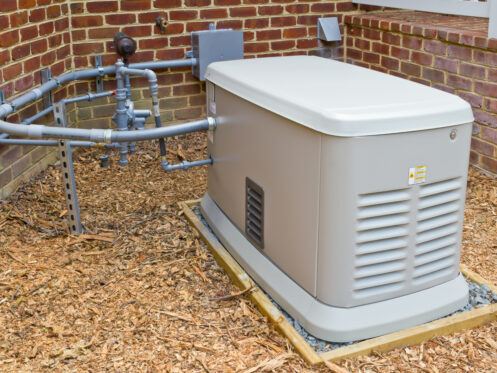A household generator acts as a reliable backup power source, ensuring your home remains functional during a power outage. They provide electricity to keep essential systems and appliances running smoothly when the grid goes down. Generators are crucial to emergency preparedness, offering protection against unexpected power loss caused by extreme weather, natural disasters, or infrastructure issues. Whether you face frequent storms, live in an area with an unreliable power supply, or simply want peace of mind, investing in a generator is a way to maintain uninterrupted electricity.
Types of Home Generators
Home generators come in three main types: standby, portable, and inverter.
Standby Generators
These systems automatically detect power loss and switch on to provide uninterrupted electricity. They run on natural gas or propane and are powerful enough to support major appliances and even entire households during extended outages.
Portable Generators
Most portable generators run on gasoline. Because manufacturers design them for mobility, they can only power a few essential appliances during a short outage. You need to set them up during each power interruption using extension cords to connect to the appliances you want to run.
Inverter Generators
Inverter generators use advanced engines and alternators to produce clean, stable power with minimal noise. They are particularly well-suited for sensitive electronics like laptops and medical devices. However, they are expensive and not typically used to power entire households due to their lower power output compared to standby generators.
Standby generators are usually the best choice for homeowners because they provide automatic, uninterrupted power during outages. They can also supply enough electricity to run your HVAC system. Unlike portable or inverter generators, they connect directly to your home’s electrical system and can be counted on for extended outages.
When you have one installed, a licensed electrician can ensure compliance with safety standards and optimize performance. If you’re considering a standby generator for your home, exploring the benefits of installing one can help guide your decision.
1. Continual Power Supply
A major reason to get a home generator is to ensure continual power supply regardless of inclement weather or potential outages. Because generators eliminate your total reliance on the local power grid, you can keep your lights on in the house even when there are natural disasters or unexpected power grid issues in your area.
Having a generator means that you do not have to suffer through blackouts. Making sure there is always power is especially important for households with infants or children, pets, or elderly occupants. Home generators allow your household to immediately switch to a backup electricity source so that no family members are left in the dark.
2. Safety and Comfort
Generators promote home safety and maintain comfort. They help ensure proper lighting during weather emergencies and keep heating or cooling units operable even if the local power grid is unreliable. This means that you never have to suffer without air conditioning or heating due to neighborhood power shutdowns.
Many safety appliances such as fire detectors, carbon monoxide alarms, or security systems use your home electric system. Having a generator keeps them functional so that you are never susceptible to undetected smoke, toxic fumes, or security threats.
Finally, a generator is imperative for anyone with health conditions or medical devices requiring electrical power. Examples of medical equipment that depend on electricity include breathing machines like respirators or ventilators and home dialysis machines. If any loved ones have a medical condition, you should install a generator to give yourself peace of mind and to keep these family members safe.
3. Food Preservation
Power outages can quickly compromise the safety of your food. Without proper refrigeration, perishable items like dairy, meat, and fish can spoil, posing serious health risks if consumed. The Food and Drug Administration (FDA) advises discarding perishable food after just four hours without power to your refrigerator. By providing uninterrupted electricity to your refrigerator and freezer, a generator prevents food spoilage and saves you the expense of replacing groceries after an outage.
4. Remote Work Protection
According to Pew Research, approximately 22 million people work from home. In addition, the Small Business Association (SBA) reports that nearly 19 million companies are home-based businesses. These companies and individuals rely on electricity to power their computers and office equipment. Even a short power outage can disrupt productivity and result in financial loss. A generator keeps electricity flowing so that anyone working from home can continue earning money and communicating with customers and clients.
5. Return on Investment
In addition to immediately addressing electrical needs, generators offer an excellent return on investment. According to Better Homes & Gardens, installing a generator may increase the value of a home anywhere from 3% to 5%. Alternatively, a report from the National Association of Realtors found that standby generators may offer a return on investment of up to 150%. If you plan to sell your home, a backup generator is a solid feature that can make the house attractive to buyers on the real estate market.
6. Continued Operation of Your Plumbing System
While you may not consider plumbing an immediate concern when the power goes out, several plumbing components rely on electricity. If you have an electric water heater, power outages can mean the loss of hot water from your showers, sinks, or other plumbing features. In addition, most sump pumps use electricity to drain water from basements or crawlspaces. If the power goes out and you do not have a backup source of electricity, your sump pump will not be able to keep your home dry. Even homes with a well often use electronic pumps or filtration systems. Without electricity, your well can cease to provide clean water for drinking or bathing. A generator keeps these elements of your plumbing system operating properly.
7. Protection When You Are Away
Owning a generator ensures your property remains protected even when you’re away on a vacation or business trip. Nothing is worse than returning home to a refrigerator full of spoiled food or a flooded basement due to a non-functioning sump pump. Electricity is restored automatically with a generator, allowing essential systems to keep running in your absence. This added peace of mind means you can leave home without worrying about damages caused by unexpected outages.
8. Convenience and Longevity
Modern generators can supply electricity within milliseconds. This means you may barely notice the transfer to backup power and can go on with your day without disruption. Standby generators also have substantial usable lifetimes. A well-maintained generator may last 20 to 40 years. Installing a generator means having an on-site resource to get through season after season of power outages.
Reliable Home Generator Services
At [compay_name], we have been serving the residents of Richland Hills, TX and the surrounding areas for years. We install, maintain, and repair whole-home generators. Additionally, we can help with your other electrical needs, such as upgrading electrical panels, rewiring, and installing EV stations. Contact us today to schedule an appointment with one of our experienced electricians.


